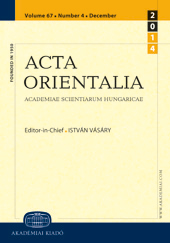Die Buddhistischen Sogdischen Texte in der Berliner Turfansammlung und die Herkunft des Buddhistischen Sogdischen Wortes für Bodhisattva
Die Buddhistischen Sogdischen Texte in der Berliner Turfansammlung und die Herkunft des Buddhistischen Sogdischen Wortes für Bodhisattva
Author(s): Yutaka YoshidaSubject(s): Language and Literature Studies, Theology and Religion, Comparative Studies of Religion, Indian Philosophy
Published by: Akadémiai Kiadó
Keywords: Sogdian; Central Asian Buddhism; Turfan; Tocharian loanwords; Uighur;
Summary/Abstract: In the present article some unpublished Buddhist Sogdian texts belonging to the German Turfan collection are studied. Apart from a small fragment from the Sogdian version of the Pañcaviṃśatisāhasrikā-mahā-prajñāpāramitā-sūtra , I selected those texts which belong to categories unknown or not well represented among the Buddhist Sogdian texts published so far. Thus, specimens of the vinaya literature, Zen Buddhism and apocryphal texts are cited. One group of fragments contains Tocharian loanwords and is likely to have been translated from Tocharian, while another group is unique in that it is provided with a colophon in the Uighur language. Finally, various forms denoting “bodhisattva” are collected and in light of their distribution and number of occurrences among the texts I challenge the generally accepted view that they came into Sogdian via Parthian, and that the Uighur form bodisavt had its origin in Sogdian.
Journal: Acta Orientalia Academiae Scientiarum Hungaricae
- Issue Year: 61/2008
- Issue No: 3
- Page Range: 325-358
- Page Count: 34
- Language: German
- Content File-PDF

